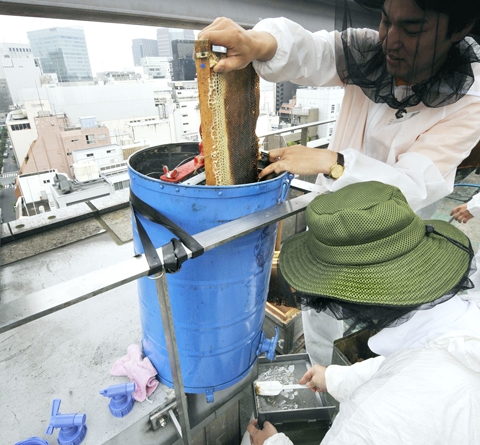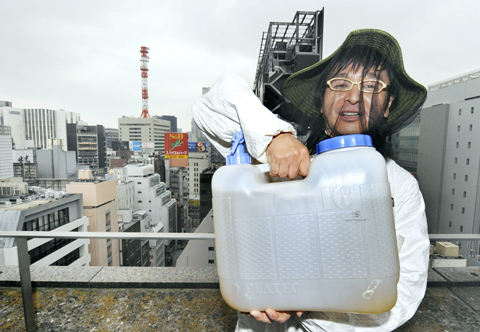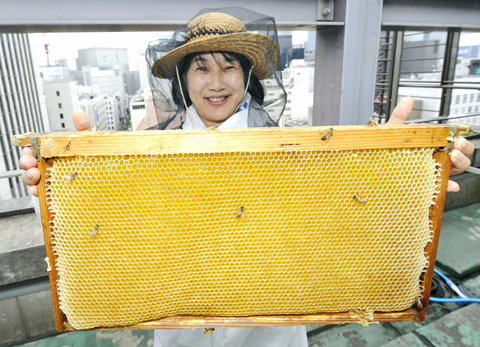Tokyo’s Ginza district is usually abuzz with shoppers and office workers, but high above its skyscrapers nature-lovers have created a home for real busy bees — the ones that make honey.
It’s part of a project to bring a slice of natural life back to the center of the world’s largest urban sprawl, a cityscape home to more than 30 million people that stretches far beyond the horizon.
Eleven stories above the heart of the Tokyo concrete jungle — with its beehive office partitions and swarms of suit-clad worker-bees — enthusiasts have stacked up beehives dripping with golden honey.

PHOTO: AFP
“Let’s enjoy the harvest, but be careful you don’t have an accident,” urban beekeeper-in-chief Kazuo Takayasu tells his fellow volunteers from behind the protective fine-mesh net covering his face.
Clad in white body suits, the crew gets to work, squeezing out the glistening syrup using a simple centrifugal machine they crank by hand as a cloud of bees breaks free from the honeycombs.
“Don’t be scared. They don’t sting unless you harm them,” says Satoshi Nagai, 49, who has taken a break from his desk at Mitsubishi UFJ Morgan Stanley Securities. “Try the honey. The scent has a touch of citrus.”

PHOTO: AFP
The honey is largely organic, he said, because pesticide use has been banned in Tokyo city parks and gardens including the Imperial Palace, about 1.5km away, where the bees collect much of their nectar.
“Through beekeeping, you get to learn how harmful pesticides are for insects,” he said. “It makes you think about your hobby of playing golf on courses which cannot be maintained without pesticides.”
The beekeepers may be an odd sight in the Japanese capital, but they are not the only urban farmers — on a rooftop just blocks away, barefoot farmers were recently wading through almost knee-high mud to plant a wet rice field.

PHOTO: AFP
On top of the building of the Hakutsuru Sake Brewing Co, its employees and their spouses and children are screaming with excitement as they stomp barefoot, the mud squelching between their toes.
“Good job, good job! Well done!” says Asami Oda, 56, the vice president of Hakutsuru’s Tokyo office, who takes care of the rice paddies every day. “We harvest 60kg of rice every year, from which we make 80L of sake. Of course it’s organic. I like having a pesticides-free harvest, which is also good for the honey bees,” he says.
Projects such as these have gained attention here this year as Japan readies to host a 193-nation international conference on biodiversity, which aims to find ways to stem the world’s massive species loss.
The 10th meeting of the Convention on Biological Diversity will be held in the central city of Nagoya in October to discuss a pressing environmental issue that has received less attention in recent years than climate change.
Animal and plant species are disappearing around the world at the fastest rate known in geological history and most of these extinctions are tied to human activity, the UN Environment Programme says.
Species under threat include 21 percent of all known mammals, 30 percent of known amphibians and 12 percent of known birds, according to the International Union for Conservation of Nature.
The Earth is now losing a species about once every 20 minutes, the non-profit group Conservation International estimates.
Scientists warn that wildlife habitat destruction is destroying ecosystems that give humans “environmental services” such as clean water and air and are vital for climate control and food production.
Honeybees are a case in point in Japan.
The price of honeybees has doubled in recent years after imports were banned to prevent the spread of parasites and as local populations declined in a phenomenon that beekeepers have blamed on pesticide use.
Because of the shortage of bees that help pollination, farmers have reported that fruits don’t grow well enough to satisfy urban consumers.
“We’ve received a number of complaints from beekeepers that pesticides kill honeybees,” Kazuo Kimura of the Japan Beekeepers Association says.
Japanese scientists taking part in the biodiversity meeting have discussed ways to convince Japan’s highly urbanized public how important biodiversity is.
“Urban beekeeping and rice growing are good examples of how human beings can reshape their relationship with nature,” says Kazuhiko Takeuchi, director of the Institute for Sustainability and Peace at the UN University in Tokyo. “Above all, it’s effective in changing people’s mindsets.”

A Chinese freighter that allegedly snapped an undersea cable linking Taiwan proper to Penghu County is suspected of being owned by a Chinese state-run company and had docked at the ports of Kaohsiung and Keelung for three months using different names. On Tuesday last week, the Togo-flagged freighter Hong Tai 58 (宏泰58號) and its Chinese crew were detained after the Taipei-Penghu No. 3 submarine cable was severed. When the Coast Guard Administration (CGA) first attempted to detain the ship on grounds of possible sabotage, its crew said the ship’s name was Hong Tai 168, although the Automatic Identification System (AIS)

An Akizuki-class destroyer last month made the first-ever solo transit of a Japan Maritime Self-Defense Force ship through the Taiwan Strait, Japanese government officials with knowledge of the matter said yesterday. The JS Akizuki carried out a north-to-south transit through the Taiwan Strait on Feb. 5 as it sailed to the South China Sea to participate in a joint exercise with US, Australian and Philippine forces that day. The Japanese destroyer JS Sazanami in September last year made the Japan Maritime Self-Defense Force’s first-ever transit through the Taiwan Strait, but it was joined by vessels from New Zealand and Australia,

SECURITY: The purpose for giving Hong Kong and Macau residents more lenient paths to permanent residency no longer applies due to China’s policies, a source said The government is considering removing an optional path to citizenship for residents from Hong Kong and Macau, and lengthening the terms for permanent residence eligibility, a source said yesterday. In a bid to prevent the Chinese Communist Party (CCP) from infiltrating Taiwan through immigration from Hong Kong and Macau, the government could amend immigration laws for residents of the territories who currently receive preferential treatment, an official familiar with the matter speaking on condition of anonymity said. The move was part of “national security-related legislative reform,” they added. Under the amendments, arrivals from the Chinese territories would have to reside in Taiwan for

CRITICAL MOVE: TSMC’s plan to invest another US$100 billion in US chipmaking would boost Taiwan’s competitive edge in the global market, the premier said The government would ensure that the most advanced chipmaking technology stays in Taiwan while assisting Taiwan Semiconductor Manufacturing Co (TSMC, 台積電) in investing overseas, the Presidential Office said yesterday. The statement follows a joint announcement by the world’s largest contract chipmaker and US President Donald Trump on Monday that TSMC would invest an additional US$100 billion over the next four years to expand its semiconductor manufacturing operations in the US, which would include construction of three new chip fabrication plants, two advanced packaging facilities, and a research and development center. The government knew about the deal in advance and would assist, Presidential